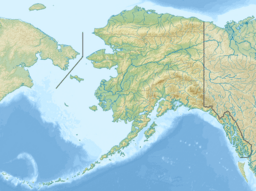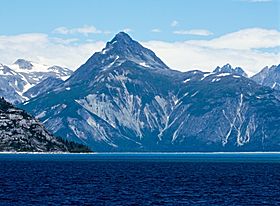Sentinel Peak (Alaska) facts for kids
Quick facts for kids Sentinel Peak |
|
|---|---|

Sentinel Peak, south aspect
|
|
| Highest point | |
| Elevation | 4,355 ft (1,327 m) |
| Prominence | 1,710 ft (520 m) |
| Parent peak | Rendu Peak (5341ft) |
| Geography | |
| Location | Glacier Bay National Park Hoonah-Angoon Alaska, United States |
| Parent range | Alsek Ranges Saint Elias Mountains |
| Topo map | USGS Mount Fairweather D-2 |
| Climbing | |
| Easiest route | South ridge |
Sentinel Peak is a 4,355-foot (1,327-meter) mountain summit located at the head of Glacier Bay's Queen Inlet in Glacier Bay National Park and Preserve, in the Alsek Ranges of the Saint Elias Mountains, in southeast Alaska. The mountain is situated immediately southwest of Carroll Glacier, 87 mi (140 km) northwest of Juneau, and 7.44 mi (12 km) east of Mount Abdallah. Although modest in elevation, relief is significant since the mountain rises up from tidewater in less than two miles. The mountain was named in 1892 by Harry Fielding Reid, an American geophysicist, who studied glaciology in Glacier Bay. He so named it because Carroll Glacier is guarded by Sentinel Peak, and a sentinel is a guard whose job is to stand and keep watch. Weather permitting, Sentinel Peak can be seen from Glacier Bay, which is a popular destination for cruise ships. The months May through June offer the most favorable weather for viewing or climbing the peak.
Climate
Based on the Köppen climate classification, Sentinel Peak has a subarctic climate with cold, snowy winters, and mild summers. Temperatures can drop below −20 °C with wind chill factors below −30 °C. Precipitation runoff from the mountain drains into Glacier Bay Basin.



